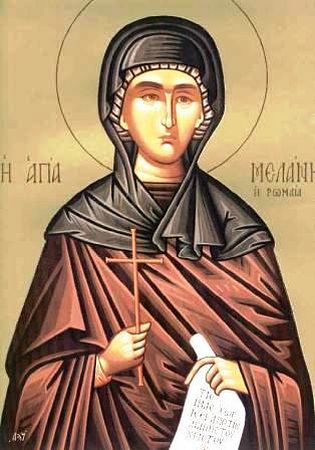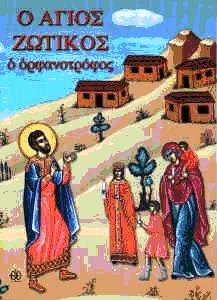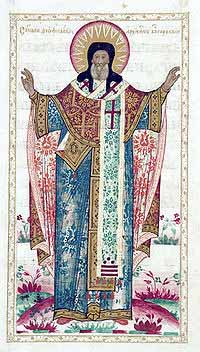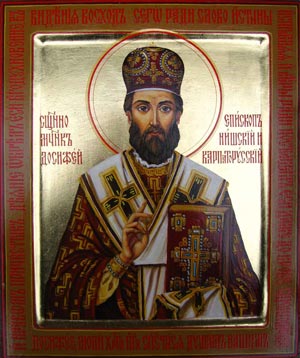|
|
Our Holy Mother Melanie the Roman Born in Rome of devout and very wealthy parents, she was forced by them to marry a young nobleman, Pinian. She was taken very seriously ill in giving birth to her second child, and told her husband that she would be healed only if he vowed before God to live with her in future as brother and sister. Her husband agreed and Melanie, in her deep joy, was healed. When it pleased God to take both children to Himself, they agreed to sell all their possessions and give the proceeds to the destitute, the Church and the monasteries. They travelled through many lands and cities, everywhere doing good works. They visited famous spiritual guides in Upper and Lower Egypt, and received much instruction and inspiration from them. During all that time, Melanie lived in strict fasting, fervent prayer and the reading of the Holy Scriptures. She followed the practice of reading the Scriptures right through, the Old and New Testaments, every three years, living with her husband as with a brother and fellow-ascetic. Going to Alexandria, they received the blessing of the Patriarch, St Cyril. After that, they went to Jerusalem and settled on the Mount of Olives. There Melanie became an anchoress, and gave herself completely to pondering, fasting and prayer. She lived thus for fourteen years, after which she came out, to help others to salvation, and founded monasteries for men and women. At the invitation of her kinsman, the senator Volusianus, a pagan, she went to Constantinople and brought him to the Christian faith (something that Blessed Augustine, whom Volusianus knew, had been unable to do).She then returned to the Mount of Olives, where she went to God in 438, at the age of fifty-seven. Born in Rome of devout and very wealthy parents, she was forced by them to marry a young nobleman, Pinian. She was taken very seriously ill in giving birth to her second child, and told her husband that she would be healed only if he vowed before God to live with her in future as brother and sister. Her husband agreed and Melanie, in her deep joy, was healed. When it pleased God to take both children to Himself, they agreed to sell all their possessions and give the proceeds to the destitute, the Church and the monasteries. They travelled through many lands and cities, everywhere doing good works. They visited famous spiritual guides in Upper and Lower Egypt, and received much instruction and inspiration from them. During all that time, Melanie lived in strict fasting, fervent prayer and the reading of the Holy Scriptures. She followed the practice of reading the Scriptures right through, the Old and New Testaments, every three years, living with her husband as with a brother and fellow-ascetic. Going to Alexandria, they received the blessing of the Patriarch, St Cyril. After that, they went to Jerusalem and settled on the Mount of Olives. There Melanie became an anchoress, and gave herself completely to pondering, fasting and prayer. She lived thus for fourteen years, after which she came out, to help others to salvation, and founded monasteries for men and women. At the invitation of her kinsman, the senator Volusianus, a pagan, she went to Constantinople and brought him to the Christian faith (something that Blessed Augustine, whom Volusianus knew, had been unable to do).She then returned to the Mount of Olives, where she went to God in 438, at the age of fifty-seven.Holy and Righteous Joseph, King David and James the Lord"s BrotherThey are commemorated on the Sunday after the Nativity of Christ. One can learn all about King David, the son of Jesse, from the Book of Kings, and for holy James see October 23rd. Righteous Joseph is so named in the Gospel (Matt. 1:19), and for this, God entrusted the most holy Virgin to his protection and gave him great honour in the economy of human salvation. Although Joseph was of the royal lineage of David, he himself was a simple carpenter in Nazareth. He took the most holy Virgin from the Temple into his home at the age of eighty, and entered into rest at the age of a hundred and ten.
Our Holy Father, the Martyr Zoticus, Protector of the Poor He was eminent both of birth and rank. He moved to Constantinople, cast off all worldly things and received ordination to the priesthood, founding a home for the poor, containing a place for the treatment of infectious diseases, and ministering to those cared for in it. He was a close acquaintance of the Emperor Constantine the Great. In retaliation for the gold that Zoticus had had from him for his plague-victims, Constantine"s son Constantius tied him behind a wild ass, which was driven about until he died of his wounds. He suffered in the fourth century. He was eminent both of birth and rank. He moved to Constantinople, cast off all worldly things and received ordination to the priesthood, founding a home for the poor, containing a place for the treatment of infectious diseases, and ministering to those cared for in it. He was a close acquaintance of the Emperor Constantine the Great. In retaliation for the gold that Zoticus had had from him for his plague-victims, Constantine"s son Constantius tied him behind a wild ass, which was driven about until he died of his wounds. He suffered in the fourth century.Blessed Theophylact, Archbishop of Ochrid Born on the island of Euboea, and educated in Constantinople by the most eminent teachers of his day, he became a priest in the Great Church. He was chosen as bishop, and sent, against his will, to Ochrid, where he spent about twenty-five years (from about 1082 to 1108). Chomatianus of Ochrid calls him "the wisest archbishop". He was a man of enormous learning, both secular and theological, of refined Byzantine tastes, and was by nature melancholy and sensitive. "Meophylact felt himself among the Slavs of Ochrid like an exile among barbarians. He wrote commentaries an the Four Gospels and on other books of the New Testament. These are the finest works of their sort after St John Chrysostom, and ate read to this day with great benefit. Of his other works, we know of his Letters, and a Life of St Clenet of Ochrid. In old age, Theophylact withdrew from Ochrid to Salonica, and finishing his earthly course, went to the blessedness of eternity. Born on the island of Euboea, and educated in Constantinople by the most eminent teachers of his day, he became a priest in the Great Church. He was chosen as bishop, and sent, against his will, to Ochrid, where he spent about twenty-five years (from about 1082 to 1108). Chomatianus of Ochrid calls him "the wisest archbishop". He was a man of enormous learning, both secular and theological, of refined Byzantine tastes, and was by nature melancholy and sensitive. "Meophylact felt himself among the Slavs of Ochrid like an exile among barbarians. He wrote commentaries an the Four Gospels and on other books of the New Testament. These are the finest works of their sort after St John Chrysostom, and ate read to this day with great benefit. Of his other works, we know of his Letters, and a Life of St Clenet of Ochrid. In old age, Theophylact withdrew from Ochrid to Salonica, and finishing his earthly course, went to the blessedness of eternity.Saint Dositej of Zagreb Metropolitan Dositej was born in Belgrade in 1887. He took Master of Theology from Kiev Religious Academy in 1904. He spent two years at the University of Berlin studying theological and philosophical science followed by philosophy studies at Leipzig. From 1907 to 1909 he taught at the Seminary of St. Sava in Belgrade. He studied at the Sorbonne and the College of Social Sciences, Paris from 1907 to 1909 and in Geneva from 1910 to 1912. Besides his native Serbian, he was fluent in Russian, Czech, German and French. He also learned Bulgarian and English.
In 1899, he was ordained to the rank of the monk at the monastery of Manasija. In May 1913, the Holy assembly of bishops of the Kingdom of Serbia elected him as a bishop. Subsequently, he was consecrated as the bishop of Nis on 25 May 1913. It was a herculean effort to tender his sheep through catastrophic situations created by successive wars and the earthquake of 1927. The Bolshevik revolution of Russia in 1917 also added to his burden. The Russian people in exile was dying of hunger in 1920’s. Bishop Dositej was part of the delegate of the Royal Yugoslavian Government in the International League for the facilitation of hungry Russians, and preached throughout Yugoslavia, urging mercy and brotherly love for the Russian people.
In 1931, Bishop Dositej was appointed as the first Metropolitan of the newly established Zagreb Diocese. He was described as an excellent teacher at the seminary, a great organizer, a good orator, well-mannered and full of Christian goodness and a true patriot. He was sent abroad by the Serbian Orthodox Church frequently as the delegate to Geneva, Basel, Athens and Bulgaria. Metropolitan Dositej visited India during the winter of 1936/37.
During the World War II, Metropolitan Dositej was arrested and imprisoned by the Nazi controlled regime of Croatia. He was brutally tortured in the prison. It is accused that the Roman Catholic nuns also actively participated in enhancing his agony while he was hospitalized. Later, the Germans transported the unconscious and terribly battered Metropolitan Dositej by train from Zagreb to Belgrade where he was housed in a Gestapo prison. Later, Metropolitan Dositej was transferred to a sanatorium since he was in critical condition. Even though he escaped a sudden death, he never recovered mentally or physically from the torture.
Metropolitan Dositej spent last days of his life at Belgrade Monastery of the Ascension under the care of the sisters of the Russian abbess Angelina. He entered into eternal rest on 14 January 1945 due to the physical and psychological wounds from the persecution. He was laid to rest at the churchyard of this monastery.
On 22 May 1998 the Holy Assembly of Bishops of the Serbian Orthodox Church declared Metropolitan Dositeja (Vasic) of Zagreb and Ljubljana as a Confessor. Hero-confessor Dositej of Zagreb and Vavedenje, was added to the list of the Serbian saints by the decision of the Holy Assembly of Bishops of the Serbian Orthodox Church in May 2000. On May 13, 2008, his sacred relics were transferred to the monastery church from the tomb in which he rested since January 15, 1945. Metropolitan Dositej was born in Belgrade in 1887. He took Master of Theology from Kiev Religious Academy in 1904. He spent two years at the University of Berlin studying theological and philosophical science followed by philosophy studies at Leipzig. From 1907 to 1909 he taught at the Seminary of St. Sava in Belgrade. He studied at the Sorbonne and the College of Social Sciences, Paris from 1907 to 1909 and in Geneva from 1910 to 1912. Besides his native Serbian, he was fluent in Russian, Czech, German and French. He also learned Bulgarian and English.
In 1899, he was ordained to the rank of the monk at the monastery of Manasija. In May 1913, the Holy assembly of bishops of the Kingdom of Serbia elected him as a bishop. Subsequently, he was consecrated as the bishop of Nis on 25 May 1913. It was a herculean effort to tender his sheep through catastrophic situations created by successive wars and the earthquake of 1927. The Bolshevik revolution of Russia in 1917 also added to his burden. The Russian people in exile was dying of hunger in 1920’s. Bishop Dositej was part of the delegate of the Royal Yugoslavian Government in the International League for the facilitation of hungry Russians, and preached throughout Yugoslavia, urging mercy and brotherly love for the Russian people.
In 1931, Bishop Dositej was appointed as the first Metropolitan of the newly established Zagreb Diocese. He was described as an excellent teacher at the seminary, a great organizer, a good orator, well-mannered and full of Christian goodness and a true patriot. He was sent abroad by the Serbian Orthodox Church frequently as the delegate to Geneva, Basel, Athens and Bulgaria. Metropolitan Dositej visited India during the winter of 1936/37.
During the World War II, Metropolitan Dositej was arrested and imprisoned by the Nazi controlled regime of Croatia. He was brutally tortured in the prison. It is accused that the Roman Catholic nuns also actively participated in enhancing his agony while he was hospitalized. Later, the Germans transported the unconscious and terribly battered Metropolitan Dositej by train from Zagreb to Belgrade where he was housed in a Gestapo prison. Later, Metropolitan Dositej was transferred to a sanatorium since he was in critical condition. Even though he escaped a sudden death, he never recovered mentally or physically from the torture.
Metropolitan Dositej spent last days of his life at Belgrade Monastery of the Ascension under the care of the sisters of the Russian abbess Angelina. He entered into eternal rest on 14 January 1945 due to the physical and psychological wounds from the persecution. He was laid to rest at the churchyard of this monastery.
On 22 May 1998 the Holy Assembly of Bishops of the Serbian Orthodox Church declared Metropolitan Dositeja (Vasic) of Zagreb and Ljubljana as a Confessor. Hero-confessor Dositej of Zagreb and Vavedenje, was added to the list of the Serbian saints by the decision of the Holy Assembly of Bishops of the Serbian Orthodox Church in May 2000. On May 13, 2008, his sacred relics were transferred to the monastery church from the tomb in which he rested since January 15, 1945. |